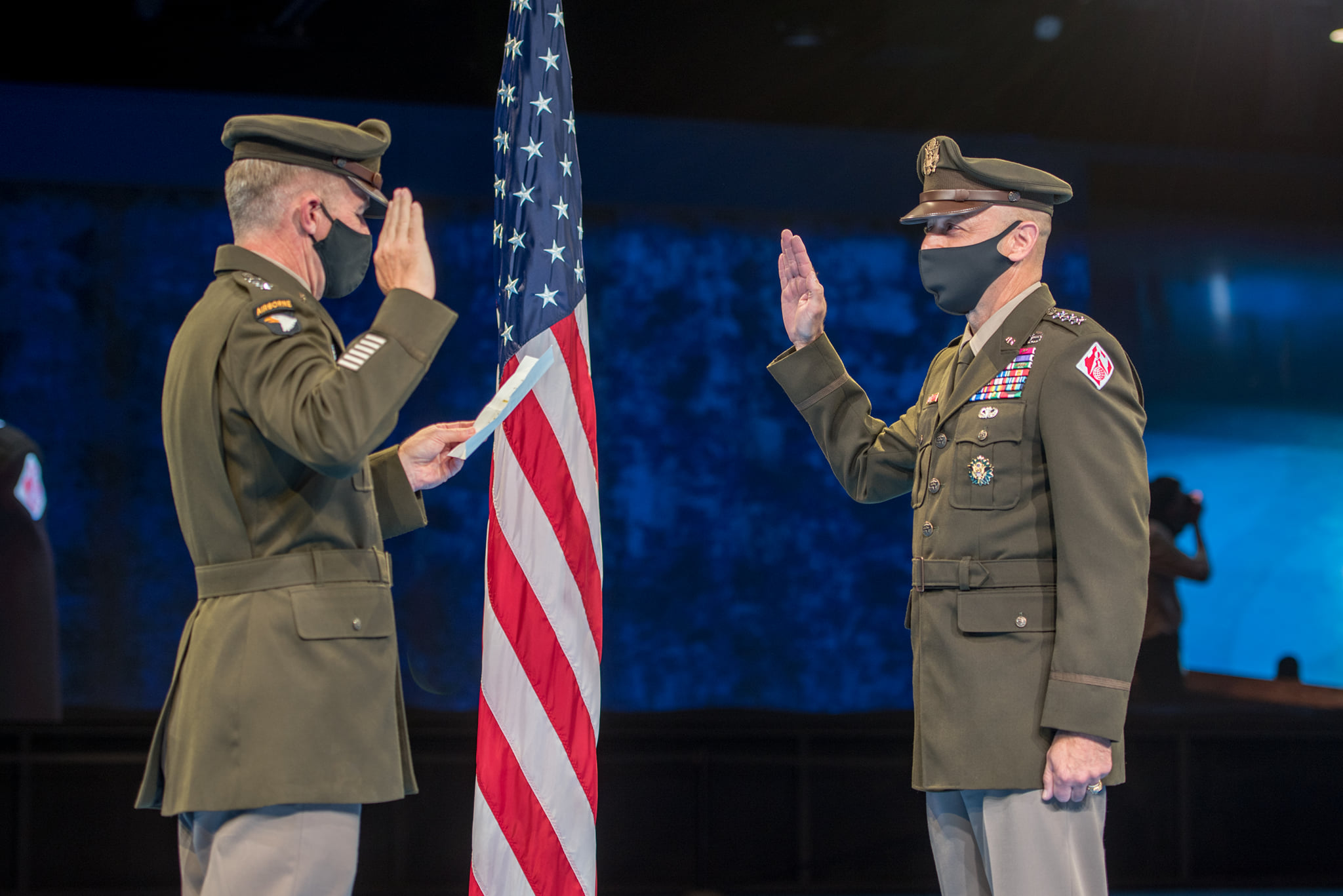Washington, D.C.—Lt. Gen. Todd Semonite, the 54th Chief of Engineers and Commanding General of the U.S. Army Corps of Engineers since 2016, retired and was succeeded by Lt. Gen. Scott Spellmon September 10.
Preceding a change of command ceremony, Spellmon was honored by a virtual ceremony marking his promotion from major general. He had been the deputy commanding general for civil and emergency operations and previously served as commander of the Northwestern Engineer Division.
Spellmon’s other command assignments include commanding general, U.S. Army Operational Test Command, Fort Hood, Texas; commander, 1st Maneuver Enhancement Brigade, Fort Polk, La.; commander, 317th Engineer Battalion and 3-3rd Brigade Special Troops Battalion, both as part of the 3rd Brigade Combat Team, 3rd Infantry Division at Fort Benning, Ga.; and commander, C Company, 82nd Engineer Battalion, Bamberg, Germany.
His previous staff assignments include executive director, Office of the Chief of Engineers, Headquarters, Department of the Army; chief of staff, U.S. Army Maneuver Support Center of Excellence, Fort Leonard Wood, Mo.; engineer intelligence officer, Allied Command Europe Rapid Reaction Corps, Rheindahlen, Germany; and observer-controller, Combat Maneuver Training Center, Hohenfels, Germany.
Spellmon’s operational deployments include Operation Desert Shield/ Desert Storm Kuwait, Iraq; Operation Iraqi Freedom, Iraq; and Operation Enduring Freedom, Afghanistan.
His military awards and decorations include the Legion of Merit, Bronze Star (with two Oak Leaf Clusters), Purple Heart, Defense Meritorious Service Medal, Meritorious Service Medal (with two Oak Leaf Clusters), Army Commendation Medal (with four Oak Leaf Clusters), Joint Service Achievement Medal and the Combat Action Badge.
A graduate of the U.S. Military Academy (USMA) at West Point, Spellmon received his commission as a second lieutenant in 1986. He holds a Bachelor of Science degree from USMA, a Master of Science degree in civil engineering from the University of Illinois and a Master of Science degree in national security strategy from the U.S. Army War College.
Semonite was honored with a retirement ceremony hosted by the chief of staff of the Army.
He also received the 2020 President’s Award from the American Society of Civil Engineers (ASCE) for his prominent role in the Corps’ response to the coronavirus pandemic that included a nationwide effort to build backup hospitals.
“Few leaders I know have accomplished so much for the nation during peace and war as Todd Semonite,” said retired Lt. Gen. Tom Bostick, professional engineer and ASCE Distinguished Member.
“Not only does he find a way to accomplish the impossible. He does so while inspiring his people.” Semonite was awarded ASCE’s OPAL leadership award in the category of Construction in 2019.
During his 40-year career, ASCE noted, the West Point graduate has held significant positions of responsibility with the Army, and his leadership has included disaster response and construction as a result of Superstorm Sandy in the Northeast; construction support to the Southern Command in Central and South America; and program and project management for construction in Iraq and Afghanistan.
‘Clean’ Continuing Resolution
Top negotiators for the White House and Congress have agreed to a “clean” continuing resolution (CR) to avoid a government shutdown and keep the federal agencies funded into fiscal year 2021, which begins October 1.
“We don’t want to see a government shutdown,” U.S. Treasury Secretary Steven Mnuchin said on Fox News Sunday.
Mnuchin also confirmed the stopgap funding measure will run through the beginning of December. That timeframe would get the matter past the November elections by several weeks.
Mnuchin was speaking not only as a top official for the Trump administration but also its chief negotiator with House Speaker Nancy Pelosi (D-Calif.) over the fiscal year 2021 appropriations as well as the stalled efforts to move another coronavirus relief package.
Later, Pelosi also expressed confidence that a government shutdown will be avoided.
“We will come to an agreement on that. I feel quite certain,” she said on Bloomberg’s Balance of Power.
A CR is never the favorite option for appropriators or federal agencies because it essentially bars funding increases as well as new programs, some of which have been in the works for months and even longer.
There was little choice this year as the current appropriations process had broken down completely with the Democratic-controlled House passing spending bills that Senate Republicans, who control their chamber, said would never be acceptable.
Meanwhile, senators failed to pass any of their 12 annual appropriations bills through committee after they were unable to reach an agreement on how to proceed.
Having members of Congress back in Washington appeared to do little to break the weeks-long impasse over passing another coronavirus relief package.
Senate Majority Leader Mitch McConnell (R-Ky.) announced a vote on a “targeted” proposal that is expected to be about half the size of a $1.3 trillion offer discussed recently by White House Chief of Staff Mark Meadows.
Top Democrats had rejected that offer, as they did McConnell’s offer, as inadequate.
In May, the Democratic-controlled House passed a $3 trillion measure that was dismissed by Republicans.
McConnell set the stage for a vote on the Republican plan before the end of the week.
Ballast Water Research
The Environmental Protection Agency (EPA) announced a $5 million cooperative agreement between the Maritime Administration and the University of Wisconsin-Superior supporting ballast water research as part of its investment in restoring the Great Lakes.
“By supporting research and development of ballast water treatment systems for cargo ships, we can prevent further invasive species from taking hold in the Great Lakes and protect these unique ecosystems,” EPA Associate Deputy Administrator Doug Benevento said.
Additional grants also were announced as part of the Great Lakes Restoration Initiative.
Recordkeeping Change
Vessel owners and operators are no longer required to submit quarterly reports to the Coast Guard of their discharges of bulk dry cargo residues into U.S. waters of the Great Lakes, according to a clarification from the Office of Operating and Environmental Standards.
Recordkeeping on board is still required, a mariner blog posting stated, adding vessel owners and operators may use their own forms instead of Form CG-33, which has been removed from the CG-OES website.
For additional information, contact John Morris at John.C.Morris@uscg.mil.
REC Seattle Reopens
The National Maritime Center (NMC) announced the reopening of Regional Examination Center (REC) Seattle for limited examination services beginning September 14.
REC Seattle followed Boston, Honolulu, Houston, Juneau, Long Beach, Memphis, Miami and Toledo as well as Monitoring Units (MUs) Ketchikan and San Juan in reopening.
NMC stated mariners seeking to schedule examinations at those locations may contact them directly.




